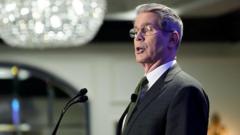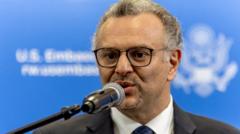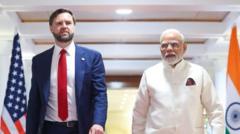#### Summary: US Treasury Secretary Scott Bessent emphasizes a significant chance for an agreement between the US and China, contingent upon China's commitment to economic reform and reduced reliance on manufacturing exports, amidst rising tariffs and a contentious trade landscape.
### Potential for a Historic US-China Trade Agreement, Says Bessent

### Potential for a Historic US-China Trade Agreement, Says Bessent
#### Treasury Secretary highlights key opportunity amid escalating trade tensions.
In a recent statement, US Treasury Secretary Scott Bessent expressed optimism about forming a major trade agreement with China, labeling the forthcoming discussions between the two nations as a pivotal moment. Bessent emphasized that if China is genuinely dedicated to diminishing its reliance on manufacturing exports, there is a substantial chance to forge a new path in trade relations.
Bessent conveyed this outlook while addressing attendees at the International Monetary Fund (IMF) conference, highlighting the shared understanding that reforms are necessary for China's economy. "China needs to change. The country knows it needs to change. Everyone knows it needs to change. And we want to help it change because we need rebalancing too," he stated.
The backdrop of this dialogue is the escalating trade war between the US and China, which has seen both nations imposing considerable tariffs on each other's products. The US has implemented tariffs reaching as high as 145% on Chinese imports, while China responded with a 125% tax on US goods. Bessent acknowledged the seriousness of the situation, indicating that both parties need to act decisively to avert further economic instability.
He remarked on the necessity for the US to pivot towards more manufacturing while advocating for a rebalancing of the Chinese economy to lessen its focus on export-driven growth. "If they want to rebalance, let's do it together," he urged.
In addition to trade matters, Bessent requested that the IMF and the World Bank refocus on their foundational goals of economic stability and development, criticizing their involvement in broader issues such as climate change and social policies, which he argued distract from their core missions.





















